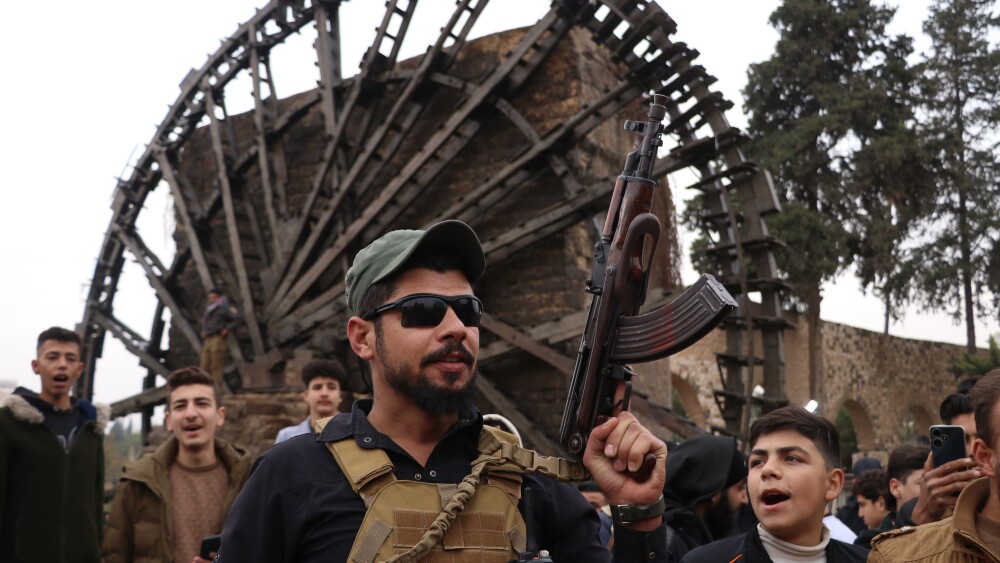Since the fall of Bashar al-Assad’s regime in December 2024, Syria’s interim government has worked to consolidate its control over state institutions. The Turkey-backed Hay’at Tahrir al-Sham (HTS) led the offensive that ultimately toppled Assad, relying on a broad coalition of rebel forces and jihadist factions, many of whom were foreign fighters.
Now, some of these jihadists have been rewarded with key positions in HTS’s defense ministry and its new army. The exact number of foreign fighters affiliated with HTS’s government remains unclear, but Syria’s self-declared interim President Ahmad al-Sharaa has appointed at least six foreign jihadists to senior roles in its intelligence service, army, and the Republican Guard. Many others have taken roles at the provincial level.
Al-Sharaa announced the promotions during a ceremony held a few weeks after the capture of Damascus. Among the 49 rebel and jihadist leaders who were elevated to the ranks of brigadier-general and colonel were nationals from Turkey, Egypt, Lebanon, Jordan, Tajikistan, and the Chinese Uyghur community.
Such appointments have alarmed Western governments. According to Reuters, during a March 18 Syria donor conference in Brussels, a senior U.S. diplomat presented Syria’s interim foreign minister with a list of demands, including conditioning partial sanctions relief in exchange for a cessation of granting senior positions in the government.
Though now portrayed as a former jihadist, [Ahmad al-Sharaa’s] loyalty to his comrades goes beyond ideology—it is a strategic necessity.
While U.S. sanctions relief is crucial for al-Sharaa’s efforts to gain greater international recognition, meeting this condition would be challenging. He cannot afford to destabilize his coalition by sidelining key figures. Though now portrayed as a former jihadist, his loyalty to his comrades goes beyond ideology—it is a strategic necessity. Prior to its integration into the new Syrian military, HTS had perhaps 30,000 fighters. The current HTS defense ministry draws most of its manpower from other forces, including foreign jihadists and Turkey-backed groups. To keep these rogue factions in check, al-Sharaa understands that his loyalists, including many foreign jihadists, must remain in key positions. This is particularly important as large swaths of territory remain outside his control.
Under mounting pressure from Western governments, al-Sharaa may choose to scapegoat some rank-and-file jihadists within his ranks, especially since many have become a political liability in recent weeks. During the March 7-9 massacres against the Alawite community in western Syria, HTS-aligned foreign jihadists reportedly played a role in perpetrating atrocities against civilians. However, expelling some foreign jihadists would not be enough, because Western demands specifically target senior leaders—individuals al-Sharaa cannot afford to lose, at least for now.
Despite his earlier assurances of inclusivity and modern state-building, al-Sharaa’s recent actions —particularly regarding the interim constitution and the military formation—make it clear that he has no intention of alienating his jihadist allies. Instead of focusing on recruiting Syrians or facilitating the return of former military officers who defected from the regime during the civil war, HTS and its leadership are consolidating power among loyalists, including foreign jihadists. The HTS defense ministry has made no serious effort to engage with senior military defectors, especially those with secular learnings.
Even if al-Sharaa’s government is accepted by the international community, it will still have to contend with its foreign and local jihadist friends. While its few overtures of moderation, however minimal and nominal, may appear grudgingly acceptable by these jihadists, they are merely temporary measures by al-Sharaa and his supporters. Such Band-Aids are unlikely to address underlying challenges posed by jihadists who seek to transform Syria into a full-blown Islamic emirate. Their presence in Syria is a ticking time bomb, and both antagonizing and appeasing them could trigger a new conflict.







